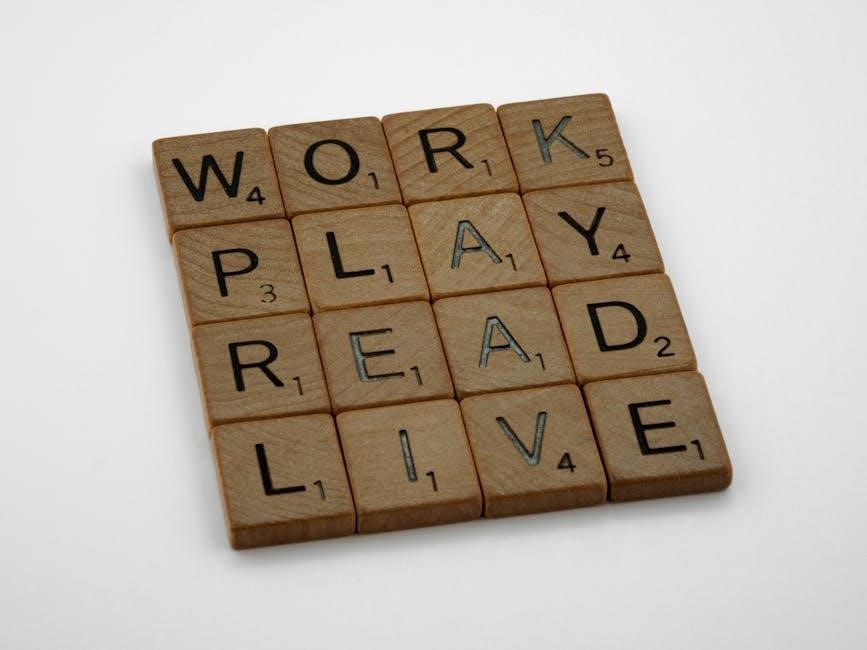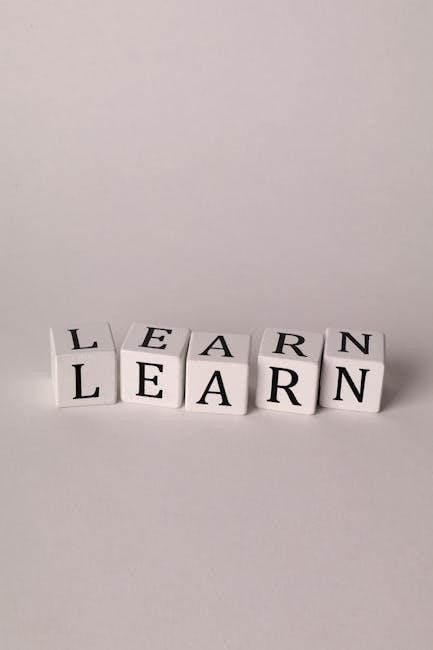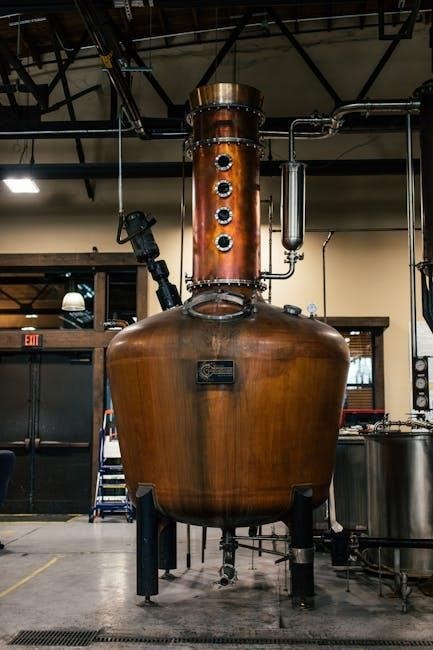The clue “Instruction to play briskly” often appears in crosswords, with common answers like Allegro (7 letters), Vivace (6), Scherzo, and Trot (4). These terms are rooted in music.
Understanding the Context of the Clue
The crossword clue “Instruction to play briskly” typically relates to musical terminology, as such terms are commonly used in crosswords due to their brevity and specificity. The clue hints at a directive often found in sheet music, guiding performers on tempo and style. Musical instructions like Allegro, Vivace, or Scherzo are frequently associated with this clue, as they indicate a lively or brisk pace. Sometimes, the clue might also reference non-musical terms like Trot, which can similarly imply a brisk movement. The clue’s context often includes hints about the answer’s length or its linguistic origin, helping solvers narrow down the possibilities. Understanding the musical or movement-related connotations of the clue is key to identifying the correct answer efficiently.
Importance of Musical Terms in Crossword Puzzles
Musical terms are a popular choice in crossword puzzles because they offer a rich source of concise, unique words. These terms often have specific meanings and are less commonly used in everyday language, making them ideal for creating challenging yet solvable clues. For instance, terms like Allegro or Vivace are succinct and carry clear definitions, making them perfect for crossword answers. Additionally, musical terms frequently have an international appeal, as many are derived from Italian, the language traditionally used in musical notation. This diversity adds variety to crosswords, appealing to a broad range of solvers. The use of musical terms also encourages learning and cultural enrichment, as solvers may be introduced to new words and concepts. Thus, their inclusion enhances both the challenge and the educational value of crossword puzzles.

Musical Instruction to Play Briskly: Key Terms
The clue “Instruction to play briskly” refers to musical terms like Allegro (7 letters), Vivace (6), Scherzo, and Trot (4), which add variety to crossword puzzles with their unique meanings and lengths.
Allegro: A Lively Tempo
Allegro is a widely recognized musical term that means “lively” or “fast” in Italian. It is commonly used in crossword clues as an answer to “Instruction to play briskly,” with a length of 7 letters. Composers often use Allegro to indicate a tempo ranging from 120 to 168 beats per minute, making it a brisk yet not overly frantic pace. This term is frequently found in symphonies, sonatas, and other classical compositions. In crossword puzzles, Allegro is a popular choice due to its clear association with music and its manageable letter count. Its widespread use makes it a key term for both musicians and crossword enthusiasts alike, ensuring its relevance in various contexts.

Vivace: A Brisk and Spirited Pace
Vivace is an Italian musical term that translates to “lively” or “spirited,” often used in crossword clues as a 6-letter answer for “Instruction to play briskly.” It signifies a brisk tempo, typically between 168 and 200 beats per minute, faster than Allegro. Composers use Vivace to convey energy and liveliness, often in orchestral and instrumental pieces. In crosswords, its shorter length makes it a favorite among puzzle creators and solvers. Vivace combines speed with a playful demeanor, distinguishing it from other brisk tempos like Scherzo. Its dual role in music and puzzles highlights its enduring relevance and popularity.

Scherzo: A Fast, Playful Movement
Scherzo is an Italian term meaning “joke,” commonly used in music to denote a fast, playful movement. It often appears in crosswords as a 7-letter answer to “Instruction to play briskly.” Unlike Allegro or Vivace, Scherzo emphasizes humor and wit, making it unique. Composers like Beethoven frequently used Scherzo to replace the traditional minuet in symphonies, adding a lively, energetic feel. In crosswords, Scherzo is a popular choice due to its distinctive meaning and moderate length. While it shares a brisk tempo with other terms, its playful connotation sets it apart, making it a memorable and enjoyable clue for solvers. Scherzo thus bridges music and puzzles, offering both cultural depth and intellectual challenge.

Common Crossword Answers for “Instruction to Play Briskly”
Common answers include Allegro (7 letters), Vivace (6), Scherzo (7), and Trot (4). These terms are musical instructions indicating a brisk tempo, often used in crosswords for their concise meanings.
Allegro (7 Letters)
Allegro is a widely recognized musical term that translates to “brisk” or “lively” in Italian. It is commonly used in crossword puzzles as an answer to clues like “Instruction to play briskly.” This 7-letter word denotes a tempo that is quick and energetic, often used in classical music to indicate a spirited pace. In crosswords, Allegro frequently appears due to its concise length and clear meaning, making it a popular choice for constructors. The term is essential for crossword enthusiasts to know, as it is a standard answer in many puzzles. Its musical origin adds cultural depth, making it both informative and engaging for solvers. Understanding Allegro can significantly improve one’s ability to solve crossword clues related to music or tempo instructions.
Vivace (6 Letters)
Vivace is an Italian musical term that means “lively” or “brisk,” often used in crossword clues related to tempo instructions. It is a 6-letter word that signifies a spirited and energetic pace, slightly faster than Allegro. In musical compositions, Vivace directs performers to play with vigor and vitality, adding a dynamic quality to the piece. This term is frequently encountered in crossword puzzles as an answer to clues like “Instruction to play briskly” due to its concise length and clear meaning. For crossword enthusiasts, recognizing Vivace can be advantageous, especially when solving puzzles that incorporate musical terminology. Its specific connotation of liveliness makes it a popular choice for constructors seeking to challenge solvers with a mix of cultural and linguistic knowledge. Understanding Vivace enhances one’s ability to navigate crossword clues effectively, particularly those tied to musical directions and tempos.

Allegretto (10 Letters)
Allegretto is a musical term that translates to “slightly brisk” or “moderately fast,” often used in crossword clues related to tempo instructions. It is a 10-letter word that indicates a pace slightly slower than Allegro but faster than Andante. In musical compositions, Allegretto guides performers to maintain a lively yet controlled rhythm, balancing energy with precision. This term is commonly found in crossword puzzles as an answer to clues like “Instruction to play briskly” due to its specific tempo indication. For crossword enthusiasts, recognizing Allegretto can be beneficial, especially when solving puzzles that include musical terminology. Its nuanced meaning of a moderately brisk pace makes it a suitable choice for constructors aiming to test solvers’ knowledge of musical directions. Understanding Allegretto adds depth to one’s ability to decode crossword clues, particularly those involving tempo markings and musical phrasing.
Trot (4 Letters)
Trot is a concise 4-letter answer to crossword clues related to a brisk or lively pace. It is often used in musical contexts to denote a steady, rhythmic gait, similar to the movement of a horse. In crosswords, Trot is a popular solution for clues like “Instruction to play briskly” or “Musical direction for a quick tempo.” Its brevity makes it a common choice for constructors seeking shorter answers. While not as technical as terms like Allegro or Vivace, Trot effectively conveys the idea of a brisk pace in a more colloquial manner. Solvers might encounter it in puzzles focusing on both music and general knowledge. Recognizing Trot as a possible answer can streamline the solving process, especially in crosswords with a mix of topics. Its simplicity and clarity make it a reliable option for constructors and solvers alike, ensuring it remains a staple in crossword puzzles.

Exploring Musical Terms for Crossword Clues
Musical terms like Allegro, Vivace, and Scherzo are often used in crosswords to denote brisk tempos. These terms, rooted in classical music, add sophistication and complexity to clues, challenging solvers to connect musical knowledge with wordplay.
ModERATO: A Moderate Tempo
ModERATO refers to a moderate tempo in music, indicating a steady, mid-paced rhythm. It is often used in crossword clues as a term denoting a balanced speed, neither too fast nor too slow. While the primary focus of the “instruction to play briskly” clue leans toward faster tempos like Allegro or Vivace, ModERATO occasionally appears in related puzzles. This term highlights the diversity of musical instructions, showcasing how composers guide performers to achieve specific moods or paces. In crosswords, solvers must recognize such terms to fill in the blanks accurately. ModERATO serves as a reminder of the nuanced language of music, where precision in tempo markings is essential for both performance and puzzle-solving.
Scherzo: Its Role in Musical Compositions
Scherzo is an Italian musical term meaning “joke” or “play,” typically describing a fast, lively, and often humorous movement in compositions. It is commonly used in crosswords as a clue for “instruction to play briskly,” though it is more specific to a playful, energetic pace. Originating in the 18th century, scherzos replaced minuets in symphonies, offering composers a dynamic way to express light-heartedness. In crosswords, solvers may encounter Scherzo as a 7-letter answer, linking it to brisk tempos. While Allegro and Vivace are more direct answers, Scherzo adds a layer of musical nuance, reflecting its unique role in compositions. This term highlights the rich vocabulary of musical instructions, making it a valuable clue for crossword enthusiasts familiar with classical music terminology.
Allegretto: A Slightly Slower Brisk Tempo
Allegretto is a musical term that signifies a tempo slightly slower than Allegro but faster than Andante. It is often used in crosswords as an answer to clues like “instruction to play briskly,” though it is not as commonly referenced as Allegro or Vivace. Meaning “a little lively” in Italian, Allegretto suggests a moderate yet brisk pace, ideal for creating a sense of movement without urgency; In crossword puzzles, it appears as a 10-letter word, making it a less frequent but valid answer. This term underscores the nuanced language of musical instructions, offering depth for composers and solvers alike. While less prominent than other brisk tempo indicators, Allegretto remains a valuable clue for those familiar with musical terminology.

Using Musical Instructions in Crossword Puzzles
Musical instructions like Allegro and Vivace add variety to crossword puzzles, offering clues that challenge solvers to connect music terminology with wordplay. These terms bridge musical knowledge and linguistic puzzles, making them popular among enthusiasts seeking a unique challenge.
How to Identify Musical Terms in Clues
Identifying musical terms in crossword clues requires a blend of musical knowledge and puzzle-solving skills. Clues often hint at tempo or style, such as “play briskly,” which points to terms like Allegro or Vivace. These terms are frequently italicized in clues to indicate their musical origin. Paying attention to word lengths and letter patterns can also help narrow down possible answers. For example, a 7-letter answer for a brisk tempo is likely Allegro. Additionally, cross-referencing the number of letters with common musical instructions can quickly lead to the correct solution. This method ensures that solvers can efficiently decipher the clue and fill in the grid with confidence.
Popular Musical Terms for Crossword Enthusiasts
Musical terms are a staple in crossword puzzles, offering both challenge and variety. For enthusiasts, understanding these terms can be a game-changer. Common terms like Allegro, Vivace, and Scherzo often appear, referring to brisk or lively tempos. Allegretto and Trot are also popular, with lengths ranging from 4 to 10 letters. These terms not only add a cultural dimension to puzzles but also require solvers to think creatively. By familiarizing oneself with these musical instructions, crossword enthusiasts can enhance their problem-solving skills and tackle clues with greater ease. This knowledge also enriches their appreciation of both music and crosswords, making each puzzle a rewarding experience.

Mastering terms like Allegro, Vivace, and Scherzo enhances your crossword-solving skills. These musical instructions, originating from classical music, provide essential clues for briskly-paced gameplay, enriching both knowledge and enjoyment.

The primary musical terms indicating a brisk tempo are Allegro, Vivace, Scherzo, and Trot. Allegro (7 letters) signifies a cheerful, fast pace, commonly used in crosswords. Vivace (6 letters) adds a spirited touch to briskness. Scherzo (7 letters) refers to a lively, often playful movement, while Trot (4 letters) is a simpler term for a brisk pace. These instructions are essential for solving crossword clues related to musical tempos. Understanding their origins and meanings bridges music theory with puzzle-solving. Crossword enthusiasts often benefit from recognizing these terms, as they frequently appear in clues. Always check the letter count and context to ensure the correct answer. These terms not only enhance crossword skills but also deepen appreciation for musical terminology.
Final Tips for Solving Crossword Clues
When solving crossword clues like “Instruction to play briskly,” consider focusing on common musical terms for tempo. Allegro, meaning cheerful and fast, is a frequent answer. Check the letter count: 7 letters for Allegro, 6 for Vivace, and 4 for Trot. Recognizing these terms can enhance your solving skills and deepen your appreciation for musical terminology. Use online resources to confirm meanings and context. Understanding the Italian origins of these terms can also guide you, as many musical directions are in Italian. Avoid overcomplicating by focusing on the most standard terms, like Allegro, which is often used in crosswords. This approach will help you efficiently solve similar clues in the future.


